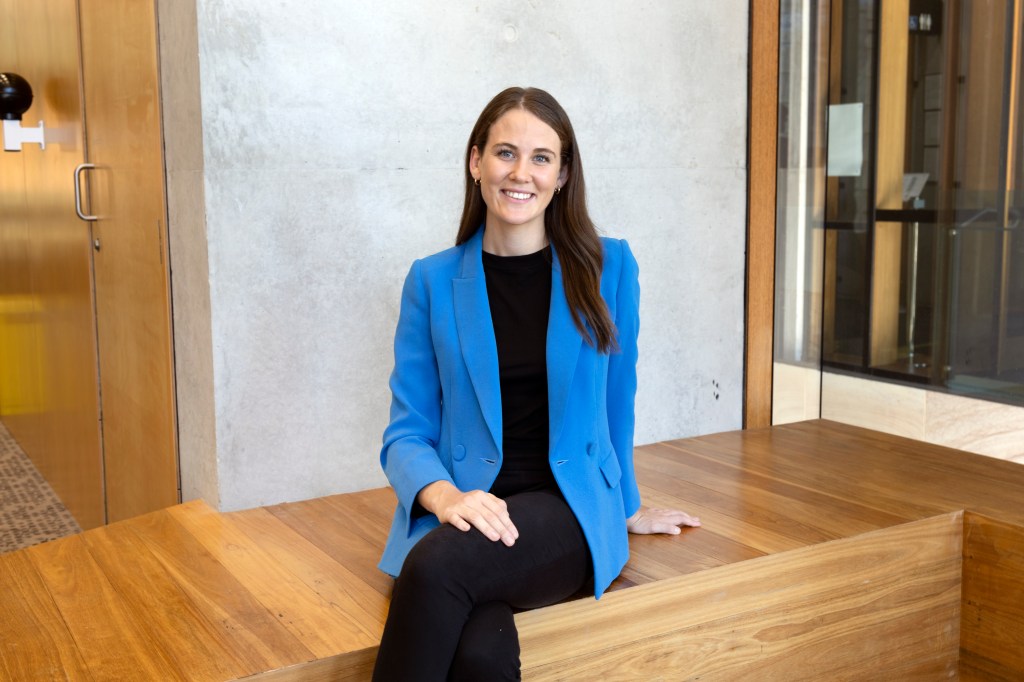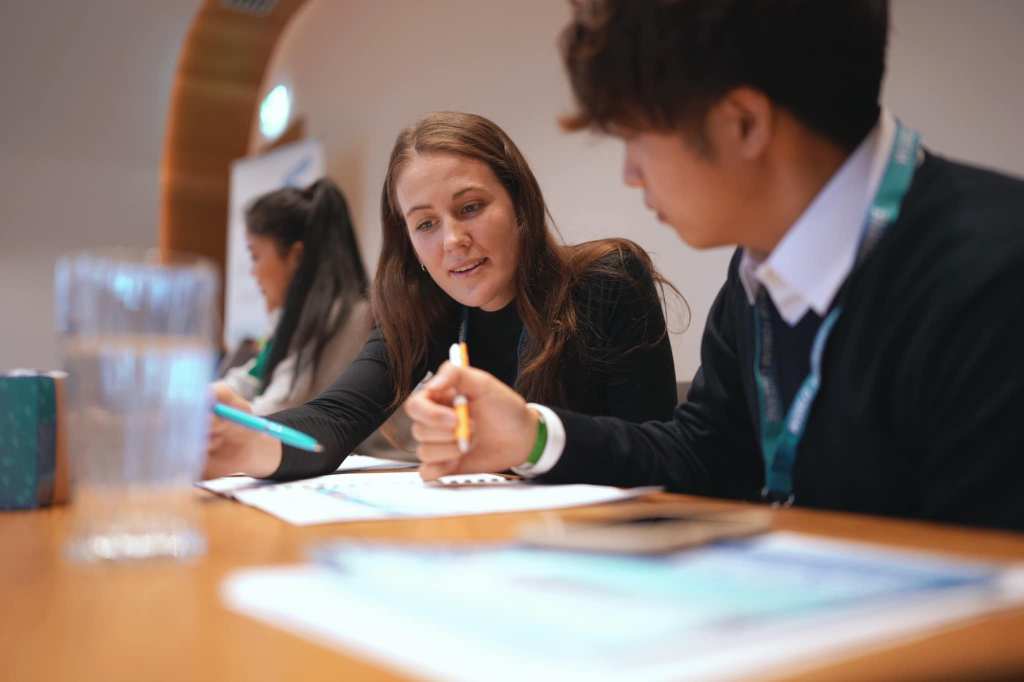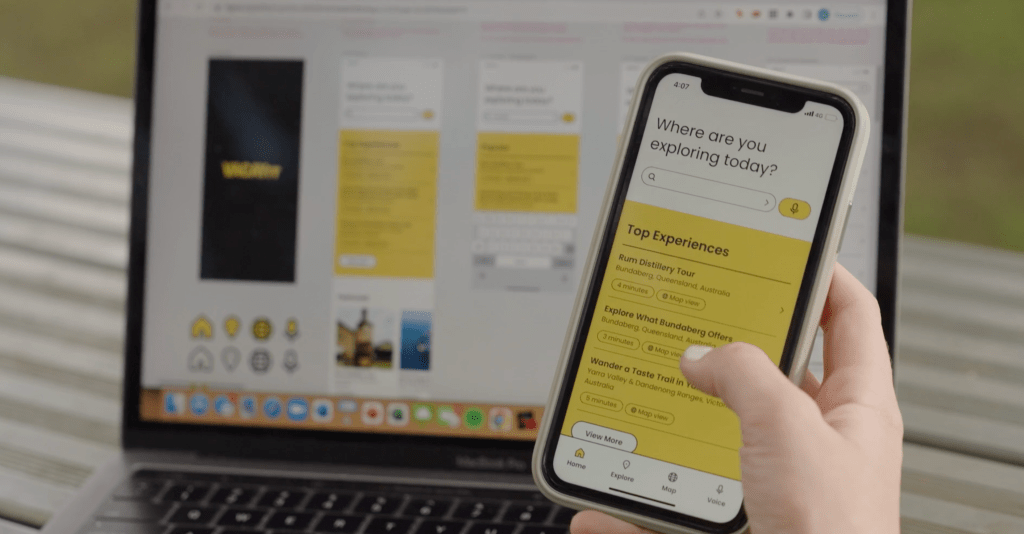At 23, Hailey Brown founded assistive tech company Vacayit, which aims to help blind and low-vision tourists make informed decisions about their holiday.
Key Takeaways
- More than 460,000 Australians are blind or have low vision, which can make travel difficult
- Accessible tourism is expected to be worth 25% of the total tourism market by 2025
- Vacayit aims to have the whole world audio-discovered, to enhance the travel experience for blind and low-vision tourists.

Many kids dream of being doctors or astronauts or zookeepers. But Hailey Brown has long travelled off the beaten path. In fact, from the age of 12, she wanted to be the managing director of Tourism Australia – by 30.
She’s taken a detour, albeit a small one. At 23, Brown has founded an assistive technology app that makes tourism more accessible for blind and low-vision travellers. She is neither blind nor low-vision, but is fiery about the topic.
It’s just unfortunate, she says, that she didn’t always have that entrepreneurial spirit founders tend to speak of. “That always makes for a good story,” she says.
Instead, she had a raging travel bug. The day after Brown graduated high school, she packed up for a year abroad, making her way through 10 different countries. She would come home with a major epiphany: “I really love people and travel.”
But here’s the issue: tourists living with disabilities can often struggle to make informed decisions about where to holiday. But the market size is undeniable. The World Health Organisation estimates that 15% of the world’s population lives with some kind of disability. In Australia, more than 460,000 Australians are blind or have low vision, and accessible tourism is predicted to take up 25% of the total tourism market by 2025.
“So much of tourism marketing is visual,” she says. “That even goes for writing: it says, ‘You need to go to the top of this mount and look at the view’. It makes it really hard to make independent decisions for travel, and it just doesn’t enrich the experience when you’re there.”
Brown didn’t have a personal stake in the matter, but she was one of six University of Queensland students asked to present to the World Tourism Forum about a gap in the tourism industry. On one of her regular Wednesday night dinners with family friend Henry MacPhillamy, who has been blind since birth, she found her topic.
“Henry is an avid traveller, he’s climbed Mount Kilimanjaro, lived in France. But he just had stories and stories of barriers to it all.”
With 12 hours to submit her proposal, she picked up a Kmart whiteboard on her way home from dinner and began scribbling down Henry’s pain points. These scribbles would culminate in the idea for an audio travel app.
“I got to the finals,” she says. “It was outrageous.”
Armed with an idea but no product, she went to UQ Ventures for some guidance. They told her to conduct 100 interviews with blind or low vision people, and find out whether the problem existed for others.
Over the span of two years, Brown joined every single blind and low vision Facebook group she could find and conducted 250 interviews in 17 countries. The results were in: “This problem wasn’t isolated to a country or an age group – it was everywhere.”
That put her plans of heading to a graduate job at Tourism Australia on hold. Instead, she was accepted the ilab Accelerator at UQ, a three month intensive program, and given $10,000 in equity-free funding to develop her idea.
In November 2021, Brown flew on a fully-funded trip to Switzerland to present at the World Tourism Forum. Her pitch won the innovation category of the Forums’ Young Talent Programme.
“Everybody, from young talent to CEOs and world leaders were in the same room, brainstorming and developing,” she recalls. “It was so incredible – that would never happen anywhere else in the world, someone at student-level talking to a world leader.”

Brown went on to bank another $30,000 after winning the Accelerator for Enterprising Women competition earlier this year.
Vacayit is now a content platform and app (live for download on both app stores) that hosts around 150 audio experiences across Australia. They partner with destination marketing organisations on a local, regional and state level. Each organisation has around 400 member cafes, hotels and experiences in the region.
The company’s head of content, Lisa, who is blind, will send those members questionnaires, provoking them to think of their offering in a sensory way. Lisa will edit the responses to create an engaging audio guide that can be used either before or at the destination for travellers to get the best experience. That’s any and all travellers.
“At the end of the day, it is a product built with accessibility in mind, but these are just audio guides. Anyone can use them,” Brown says.

The ultimate goal is to have the whole world audio-discovered.
“I never want to lose quality at any stage”
– Hailey Brown, CEO and founder of Vacayit
“I reckon we can get there,” she says. It’s the attitude of a 23-year-old with a lot of energy and passion for what she does. Though, there are times she wonders if it was the right move.
“It’s a really surreal experience when the majority of people my age are not living similar lives to me,” she says, adding that she often works 80-hour weeks.
“I’ve had to give up a lot to be able to do this. It’s easy to get jealous of others, but I also feel so passionate and I love what I do 96% of the time.”
Brown is propelling her business, with new regions added to the app monthly after the launch. By early October, Vacayit hopes to have an integrated accessible map on the platform, which would show ramps instead of stairs and slower walking paces for treks. They’re also planning on establishing new partnerships that help them accurately represent Australia in audio.
“I never want to lose quality at any stage,” she says. “If that means giving up a little bit of growth to make sure that quality is there, I’ll always choose that.”